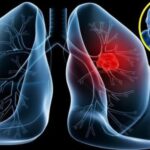Mr. Zhao, a 50-year-old man from China, experienced unusual chest pain about a year ago, but he didn’t pay much attention to it and delayed seeking medical attention. Not only did he refrain from visiting a doctor, but he also continued his unhealthy habits.
A year later, in the middle of the night, Mr. Zhao suffered from chest pain again. This time, the pain was more intense and prolonged, yet he still resisted going to the hospital. He felt that sleeping it off would be sufficient. Unfortunately, what nobody expected was that Mr. Zhao passed away that very night.

Many people believe that sudden death comes without any warning signs, but the reality is often different. (Illustrative image)
According to doctors, the real cause of Mr. Zhao’s sudden death was heart disease.
The World Health Organization (WHO) defines sudden death as: “Sudden death occurs when a seemingly healthy person dies suddenly from a natural cause within a short period of time.”
Contrary to popular belief, sudden death rarely occurs without any warning signs. A three-foot-thick ice sheet doesn’t form overnight. Many seemingly sudden illnesses are, in fact, the result of prolonged incubation periods.
Medical professionals remind us that, in the year leading up to a sudden death, there are usually six warning signs that the body exhibits. Paying attention to these signs can potentially save your life:
1. Persistent fatigue, both mental and physical
When you feel exhausted and don’t recover despite rest, it’s a sign that your body is on the brink of collapse.
Your body is your revolution’s capital. If your body is depleted, how can you persevere? By ignoring these signs, you’re only pushing yourself closer to the abyss of unexpected death. When you feel exceptionally tired, make sure to get properly checked at a hospital.
2. Prolonged insomnia, accompanied by daily lethargy and yawning
Even a machine needs to rest occasionally, let alone a human being. A third of our lives is dedicated to sleep, as it is the body’s self-repair process. Prolonged sleep deprivation can lead to significant health issues.
Chronic sleep deprivation can weaken your immune system, lead to weight gain, and cause hormonal imbalances. Prolonged exposure to these adverse conditions increases your risk of sudden death.
Research by experts from the Harvard Medical School’s Sleep Medicine Department and Brigham and Women’s Hospital has linked sleep disorders and insufficient sleep to an increased risk of cognitive decline and death from all causes. Those who sleep less than five hours a day have more than double the risk of cognitive decline and death from all causes.
3. Constant feeling of tightness in the chest, as if a heavy weight is pressing down
The heart is the body’s energy pump, and without a healthy heart, adequate blood flow to the entire body is compromised. Many people are unaware that heart problems often manifest as a distinct symptom: a feeling of suffocation in the chest, like a heavy stone pressing down. Don’t ignore this warning sign; seek medical attention as soon as possible.
4. Persistent chest pain, especially during movement or sleep
Chest pain is the most common symptom of coronary heart disease, and patients typically experience it more acutely during activity or sleep. This is the earliest and most direct warning sign from coronary heart disease, and it should not be overlooked.
5. Frequent dizziness, headaches, and a particularly irritable mood
If you’re experiencing frequent dizziness and headaches, along with an irritable mood, it’s essential to get your blood pressure checked at a hospital. These could be warning signs of high blood pressure.
Studies have found that patients with high blood pressure in their 30s have a 30% higher risk of sudden death from heart disease than those with normal blood pressure. As blood pressure increases, so does the risk of sudden death.
6. Persistent palpitations
If you’re experiencing unexplained palpitations, don’t ignore them. Visit a hospital as soon as possible. Palpitations describe a patient’s awareness of their irregular heartbeat, characterized by a feeling of the heart racing, pounding, or beating irregularly.





































